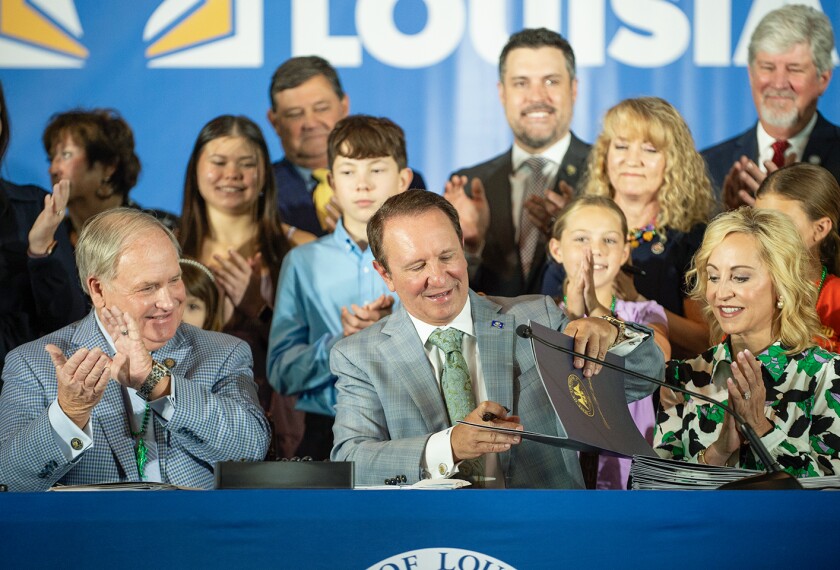Teachers have walked off their jobs in five states in recent weeks and months to protest the impact of low state education budgets on the classroom, including on their paychecks.
Have they been engaged in strikes? Aren’t strikes by public employees typically illegal?
The answers to those questions have been obscured by differing opinions, fast-moving events, and the raw political power exhibited by the teachers.
“The emphasis of what teachers have been working toward is the condition of the schools, and the conditions of the classrooms in which they teach,” said Dale Templeton, the director of collective bargaining and member advocacy for the National Education Association, whose state affiliates have been at the center of the recent walkouts in Arizona, Colorado, Kentucky, Oklahoma, and West Virginia.
“In these states, the advocacy is directed at the legislature,” she said.
The teachers’ unions’ fundamental view is that the recent job actions do not violate state prohibitions (in states that have them) against strikes by public employees because the teachers are engaged in political speech and action directed at lawmakers, not the teachers’ direct employers. These public-sector labor matters are all generally questions of state instead of federal law.
“The educators are arguing that the legislatures, over many years, are the ones who created these conditions,” said Alice O’Brien, the general counsel of the NEA. “So it’s not a strike as defined in many labor laws as a dispute between the employees and the local school district.”
In legal briefs filed with the U.S. Supreme Court in the labor law case Janus v. American Federation of State, County, and Municipal Employees, Council 31, in which a ruling is pending, the National Right to Work Foundation says 27 states have right to work laws “for the private and/or public sector,” while AFSCME says “26 states prohibit fair-share fees or public-sector collective bargaining completely.”
A right to work law makes it unlawful to require an employee to join or financially support a union as a condition of employment.
Conflicting Views
Of course, there are some differing views on the issue. In West Virginia, where teachers won a $2,000 raise after their statewide walkout in February and March, state schools Superintendent Steve Paine had warned teachers against the job action.
“Work stoppages by public employees are not lawful in West Virginia and will have a negative impact on student instruction and classroom time,” Paine said in a news release in February.
Some state leaders pointed to rulings by the state supreme court and the state attorney general in 1990, after the last major teacher walkout in West Virginia.
“There is no right to strike against the state,” the 1990 advisory opinion, signed by then-West Virginia Attorney General Roger W. Tompkins, said. “Thus, any strike or concerted work stoppage by the public teachers of this state is illegal.”
“Public teachers in West Virginia have written employment contracts that expressly prohibit strikes or work stoppages,” the opinion said.
But Robert M. Bastress, a professor at West Virginia University College of Law in Morgantown, said he viewed Tompkins’ opinion as “just plain wrong.”
“There is no state law prohibiting, as a general proposition, public-employee strikes,” Bastress said. “Certainly, if a teacher refuses to show up for work, when he or she is scheduled to be there, then a [local] board of education could pursue a disciplinary action against the teacher, subject to the substantial procedures available to teachers to grieve disciplinary actions.”
Also, a court could order striking teachers back to work, but there is no available procedure in West Virginia for a statewide injunction, Bastress added. “Such action would have to be county by county,” he said.
Local school boards in the state likely did not seek such injunctions during the recent walkout because they were sympathetic to the teachers’ demands and the action was relatively short-lived, Bastress said.
‘Just a Word Game’
In Arizona, lawmakers and Gov. Doug Ducey, a Republican, passed a state budget late last week that included raises for teachers. The breakthrough came after thousands of teachers in the heavily Republican state had walked off their jobs for a week.
O’Brien of the NEA said the state has no statutory prohibition against strikes by public employees, only some “musty-dusty old common law” that might lend support to such a view.
However, Timothy Sandefur, the vice president of litigation for the Goldwater Institute, a national free-market research and legal group based in Phoenix, noted that teachers had used their vacation and personal days in many cases and had received significant cooperation from school districts, many of which shut down and declined to dock pay from those who walked off the job.
“For teachers to collaborate to paralyze the public school system, under the Arizona Constitution, is unlawful,” Sandefur said. “It’s just a word game” to not consider the walkout a strike, he said.
The Goldwater Institute was weighing litigation against some school districts in the state because of their alleged facilitation of the walkout, Sandefur said, but the group was unlikely to proceed if the controversy was settled.
“I’d be surprised if there are any consequences” for the teachers, he said. “I think they are going to get away with it because they have power.”
One illustration of which direction the tide of public sentiment may be flowing: In Colorado, a state lawmaker proposed a bill to dismiss and jail teachers who go on strike, but he withdrew it after it failed to pass out of committee.
Three of the five recent walkouts occurred in “right-to-work” states that do not authorize collective bargaining for teachers. (Colorado and Oklahoma permit limited collective bargaining by teachers.)
“In our collective bargaining states, we are engaging our members on these issues with school districts at the bargaining table,” Templeton of the NEA said.






